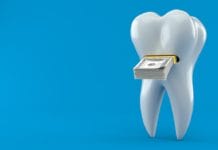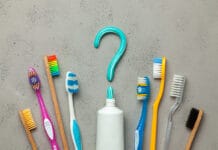A recent study based in Switzerland, titled “On the association between oral piercings and periodontal conditions—A case series,” sheds new light on how popular trends like oral piercings can affect someone’s long term dental health. The research paper was published in the International Journal of Dental Hygiene and closely examined whether oral piercings had a negative effect on the periodontal conditions of the surrounding teeth.
Risks Associated with Oral Piercings
One popular form of self-expression is oral piercings (which include tongue and lip piercings). Statista published a study in 2017 that examined the attitudes of Americans towards people with tongue piercings. The results revealed that 28 percent of the respondents between the ages of 18 and 29 years of age said they liked women with tongue piercings and 46 percent approved when either a man or woman had them.
Although people may only consider their appearance when they get an oral piercing, the decision may have lasting ramifications on their dental health.
There are many risks and challenges associated with oral piercings. For example, your tongue could have an allergic reaction if you are sensitive to the metal that is used. Your tongue may swell when it’s installed, which could block your airway and interfere with your ability to breathe. The tongue can also become numb over time due to extensive nerve damage or develop damaged blood vessels.
Some patients may be at risk of cracking their teeth if they happen to bite down too hard on their tongue or lip piercing. The constant friction of metal rubbing against the teeth can harm the tooth enamel, crack restorations, and injure the gingiva. People with oral piercings may experience an increase in saliva production and have difficulty getting a dental x-ray. Oral piercings can also interfere with the ability to chew, swallow, and speak properly.
A Closer Look at the University of Basel Study
The purpose of the University of Basel study was to investigate the association between oral piercings and periodontal health in patients who were seeking dental treatment. Three people, Julia Caroline Schmidt, Roland Weiger, Salvatore Calderaro, and Clemens Walter, contributed to the study. All of the scientists worked in the Department of Periodontology, Endodontology, and Cariology in the University Center for Dental Medicine at the University of Basel, Basel, Switzerland.
The scientists examined the dental records of 18 total young adults with oral piercings who visited the Department of Periodontology, Endodontology, and Cariology at the university during a three-month span. Three of the 18 patients had both a tongue and lip piercing, while 7 had a lip piercing. Fourteen of the patients had a pierced tongue. The scientists looked at the oral health of the teeth closest to their oral piercing compared to the surrounding teeth. The researchers also took into account their socio‐economic background and individual epidemiology.
The results of the study showed that patients with tongue piercings were more likely to bleed during an oral examination or when the gingiva was probed. They also discovered that the teeth closest to the oral piercings were more likely to be mobile and had gingival recession of ≥2 mm than the teeth that weren’t close to the oral piercing. However, patients with just their lip pierced did not experience any negative impact on their oral health in this study. Based on their findings, the researchers believe that patients with a pierced tongue should pay careful attention to the health of their gingiva and teeth.
In Conclusion
This recent study exemplifies why proper oral care is necessary for patients who have a pierced lip or tongue. Poor dental hygiene, when combined with piercings, can have an impact on their oral health. Dental professionals should create customized treatment plans for patients with oral piercings and note any gingival changes and look for signs of fractured teeth and restorations.












